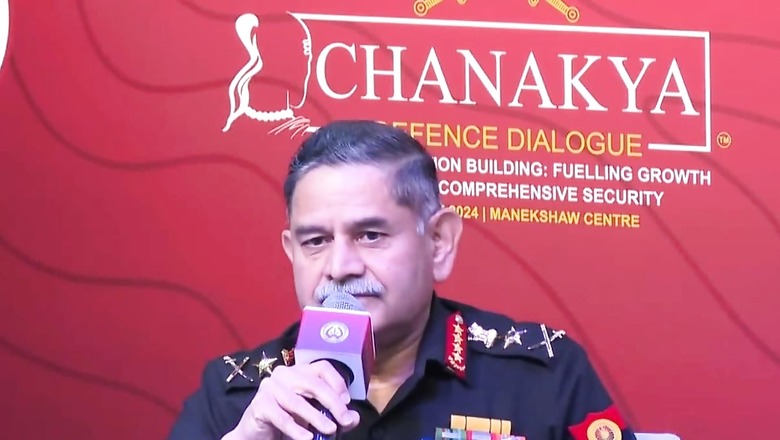
views
The Manipur conflict has become a battle of narratives over time and though the situation in the war-torn state may be stable, it remains tense, Army Chief General Upendra Dwivedi said on Tuesday as he listed the efforts being taken to restore peace in the north-eastern state.
Speaking at the Chanakya Defence Dialogue, 2024 — the second edition of the flagship event held by the Indian Army in collaboration with the Centre for Land Warfare Studies — General Dwivedi also addressed the threat of spill-over violence from Myanmar.
“In a lighter vein, [I would describe the issue as] ek ke saath ek free. Because Manipur was a problem and now you have the Myanmar issue too,” he said.
The army chief, while tracing the origins of the Manipur conflict, said violence began in May 2023 with a rumour that an Anglo-Kuki centenary gate was being burnt. “I have gone on ground and confirmed that it was not burnt. That rumour mongering led to major violence, which is now finding its stabilisation phase. Over a period of time, it has become a battle of narratives. Polarisation exists between communities. The situation may be stable today but it is tense.”
General Dwivedi said several issues plagued the state. “The number of Internally Displaced People reached 60,000 but has come down to below 40,000 now with our efforts. Society got weaponised as weapons were looted. Women-led organisations have come up for defense. We need a ‘whole of nation’ approach [to resolve the conflict].”
Listing the steps taken to restore normalcy, he said: “As far as Army and Assam Rifles are concerned, we have deployed 126 columns. We are trying to restore trust. It will take its own time as social fracturing takes time to heal.”
He added that several weapons had been recovered and the army was working closely with the central administration as well as ex-servicemen to ensure peace returns to the state.
Commenting on the possibility of a “foreign hand” in instigating violence in Manipur, the army chief said “we should not allow wrong narratives to be built up”. “Bomb drones and infiltration by 900 militants are prime examples of this. Infiltration is happening because of turmoil in Myanmar. However, they are unarmed.”
Days after claiming that 900 Kuki militants were planning to attack peripheral villages of Imphal valley districts around September 28, the Manipur government had retracted its statement, asserting that the likelihood of “any such misadventures by armed groups is minimal and unsubstantiated”.
The sources in Intelligence and Indian Army had told CNN-News18 that no infiltration had happened and “nothing is available as per our knowledge”.
They added that the Centre wants peace in any case and the idea is to settle the dispute between both the communities, noting that the timing of the input is being seen as an attempt to derail the peace process as Home Minister Amit Shah has announced the beginning of the outreach and started the fencing of the India-Myanmar border.
Since May 2023, Manipur has been embroiled in violence between the majority Meitei and minority Kuki communities, driven by disputes over economic benefits and quotas. Manipur remains divided into two ethnic enclaves – a Meitei-controlled valley and Kuki-dominated hills – separated by a no-man’s land monitored by federal paramilitary forces. Despite efforts to quell the unrest, sporadic clashes persist, with the latest violence resulting in 11 deaths earlier this month. Since May of last year, the conflict has resulted in at least 237 deaths and displaced over 60,000 people in Manipur, which is home to 3.2 million people.


















Comments
0 comment